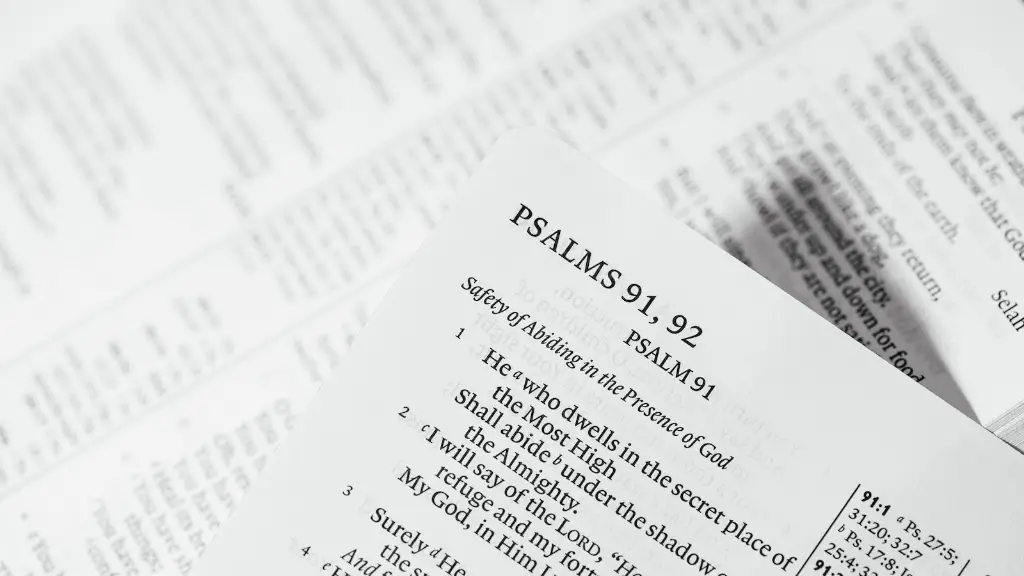The word “usury” appears in the Bible, but it is not always clear what it means. In general, usury refers to the practice of lending money at excessive interest rates. This could be considered a form of exploitation, since the borrower is charged more than the loan is worth. In some cases, the Bible condemns usury outright, while in others it simply regulating the practice.
The word “usury” appears in the King James Version of the Bible in four places: Exodus 22:25, Leviticus 25:36, Deuteronomy 23:19, and Ezekiel 18:8,17,20. In each case, the word is translated from the Hebrew word neshek, which means “to bite.” Usury refers to the practice of lending money at interest.
What does usury mean in the KJV Bible?
The term “usury” originally referred to the sum paid for the use of money, but it has come to be used more specifically to refer to exorbitant interest rates. In the Bible, the Jews were forbidden to exact usury from one another, but were allowed to charge interest on loans to Gentiles. Today, many Christians believe that usury is always wrong, regardless of the circumstances. Others believe that it is only wrong when the interest rate is excessive.
Usury laws are designed to protect consumers from being charged excessively high interest rates on loans. However, some lenders, such as payday or alternative lenders, may still charge high interest rates and fees that can trap consumers in a cycle of debt. It is important to be aware of these practices and to carefully read any loan agreement before signing.
What is usury in simple terms
Usury is a term used to describe the act of lending money at an excessively high interest rate. In most cases, the interest rate is above the legal limit set by the government. This can be a contract between two parties or simply the act of lending money with an illegally high interest rate.
Usury is a serious problem because it can take advantage of people in a difficult financial situation. When someone is desperate for money, they may be willing to accept any terms, no matter how unfair, in order to get the loan. This can lead to a cycle of debt that is very difficult to break free from.
If you are considering taking out a loan, be sure to do your research and only work with reputable lenders. Avoid any offers that seem too good to be true, as they likely are. And never agree to anything that you don’t fully understand.
Usury, or the lending of money at interest, was unanimously condemned by the Fathers of the Early Church as a damnable sin. This condemnation was echoed by popes, councils, and saints, who saw it as equivalent to robbery or even murder. For most of the first 1500 years of Christianity, usury was considered a grave offense.
Where in the Bible is usury forbidden?
The Old Testament authority does not constitute a blanket ban on interest-taking, but condemns taking interest from the poor, and within the Jewish community. The taking of interest was forbidden to clerics from AD 314.
The definition of usury according to Ibn Taymiyyah is the charging of interest on an unproductive loan, or the charging of interest greater than the real increment produced by a productive loan. This is forbidden in Islam, as it is considered to be taking advantage of the borrower’s financial situation. However, in the case of a productive loan (one that is used to generate income), the charging of interest is allowed, as long as it is proportional to the profit generated by the loan.
Is usury a sin in the Bible?
The Bible is clear that God’s people are to help the poor, not exploit them. Taking advantage of someone’s need for money by charging them interest is not righteous behavior. God calls us to compassion and to help our neighbor in their time of need.
Usury is the practice of lending money at an excessively high rate of interest. It is often considered to be a form of exploitation, due to the fact that the borrower is often unable to repay the loan and ends up in debt.
Loan-sharking, shylocking, and extortion are all words that are often used to describe usury.Interest is the amount of money charged by the lender for the use of their money. Lending and loaning are both words that describe the act of lending money.
Moneylending is the act of lending money, usually in exchange for interest. Overcharging is the act of charging more than the agreed-upon rate of interest. Payday lending is a type of loan where the borrower is required to repay the loan with their next paycheck.
Extortionate moneylending is a type of usury where the interest rate is excessively high.
How much interest is considered usury
The general usury limit refers to the maximum interest rate that can be charged on a loan. The limit is set at 24%, or four points above the average prime loan rate, whichever is less. This limitation helps to protect borrowers from being charged excessively high interest rates.
There are numerous state and federal laws that regulate and prohibit usury, or the practice of lending money at an excessively high interest rate. Usury is often enforced by state usury laws, which typically establish maximum interest rates that can be charged for loans. Violators of usury laws can incur civil and criminal penalties, including fines and jail time. In addition to state laws, the Racketeer Influenced and Corrupt Organizations Act (RICO) is a federal law that may also apply to cases of usury. RICO imposes harsh penalties for those who engage in racketeering activity, which includes usury. Those convicted under RICO can face significant fines and up to 20 years in prison.
What does the Bible say about a loan?
As the Apostle Paul said, we should pay all our debts, except the debt of love for others. This is because love is the only thing that is truly worth pursuing, and everything else is secondary. So, if we are considering taking out a loan, we should only do so if we have a solid plan for repaying it. Otherwise, we may end up sacrificing other important things in our lives in order to pay off the debt.
Nasi’ah usury is where the debtor is promised a higher interest rate if they do not pay back the debt on time. This type of usury is often seen in cases of small businesses taking out loans from banks. The lenders gain interest from the increased amount of money that the debtor will owe them if they do not make their payments on time.
Fadhl usury is where the buyer pays more for a good than its value. This type of usury often happens in cases of people buying basic necessities, such as food and water, from vendors. The vendor charges more than what the good is worth in order to make a profit. This type of usury is often seen in developing countries where people do not have other options for purchasing goods.
What is the biggest sin to God
There is a lot of debate surrounding the concept of the unforgivable sin, but the general consensus is that it refers to blasphemy against the Holy Spirit. This is seen as the most serious offense because it is an intentional rejection of God’s grace and forgiveness. Some argue that this sin is unforgivable because it is the only sin that can never be forgiven, while others argue that it is unforgivable because it leads to a complete separation from God. Either way, the unforgivable sin is a serious offense and should not be taken lightly.
Pride is an excessive feeling of self-importance and achievement. It is considered the original and worst of the seven deadly sins on almost every list. Pride is also thought to be the source of the other capital sins.
What challenged the church’s view of usury?
The Church’s view of usury was challenged by merchant wealth. Usury was the practice of lending money and charging a very high interest rate. German and English nobility disliked Italian domination of the Church. The Vatican and the Pope were located in Italy.
Interest is a percentage fee that you pay to your lender for a loan. This fee is regulated by law and is considered to be fair. Usury, on the other hand, is the act of charging excessive interest rates that are unfair to borrowers. This practice is illegal and can result in heavy penalties.
What does Proverbs say about lending money
The Bible has a lot to say about lending and borrowing, and it’s not all positive. This verse from Proverbs is a warning to both borrowers and lenders: borrowers will become slaves to lenders, and lenders will become oppressors. It’s a reminder that money is a dangerous thing, and should be used carefully.
Usury is the practice of lending money at an unreasonably high interest rate. It is illegal in most states, and the District of Columbia has some of the strictest laws in the country. Lenders who engage in usury can be sued and fined.
Final Words
Usury means lending money with interest.
In the Bible, usury is defined as the practice of lending money with interest. This practice is condemned by the Bible, and those who engage in it are instructed to lending without charging interest.





